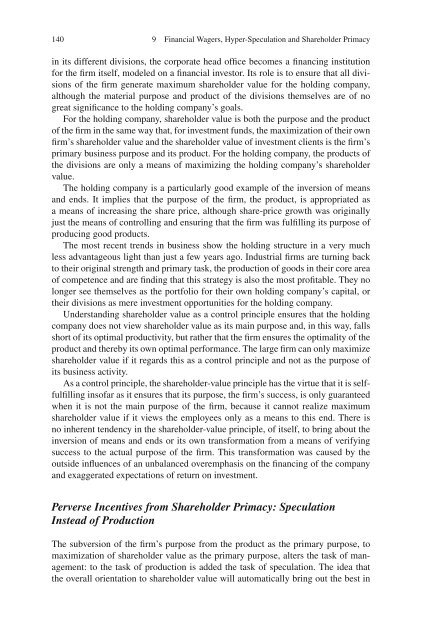The Ethics of Banking: Conclusions from the Financial Crisis (Issues ...
The Ethics of Banking: Conclusions from the Financial Crisis (Issues ...
The Ethics of Banking: Conclusions from the Financial Crisis (Issues ...
You also want an ePaper? Increase the reach of your titles
YUMPU automatically turns print PDFs into web optimized ePapers that Google loves.
140 9 <strong>Financial</strong> Wagers, Hyper-Speculation and Shareholder Primacy<br />
in its different divisions, <strong>the</strong> corporate head <strong>of</strong>fice becomes a financing institution<br />
for <strong>the</strong> firm itself, modeled on a financial investor. Its role is to ensure that all divisions<br />
<strong>of</strong> <strong>the</strong> firm generate maximum shareholder value for <strong>the</strong> holding company,<br />
although <strong>the</strong> material purpose and product <strong>of</strong> <strong>the</strong> divisions <strong>the</strong>mselves are <strong>of</strong> no<br />
great significance to <strong>the</strong> holding company’s goals.<br />
For <strong>the</strong> holding company, shareholder value is both <strong>the</strong> purpose and <strong>the</strong> product<br />
<strong>of</strong> <strong>the</strong> firm in <strong>the</strong> same way that, for investment funds, <strong>the</strong> maximization <strong>of</strong> <strong>the</strong>ir own<br />
firm’s shareholder value and <strong>the</strong> shareholder value <strong>of</strong> investment clients is <strong>the</strong> firm’s<br />
primary business purpose and its product. For <strong>the</strong> holding company, <strong>the</strong> products <strong>of</strong><br />
<strong>the</strong> divisions are only a means <strong>of</strong> maximizing <strong>the</strong> holding company’s shareholder<br />
value.<br />
<strong>The</strong> holding company is a particularly good example <strong>of</strong> <strong>the</strong> inversion <strong>of</strong> means<br />
and ends. It implies that <strong>the</strong> purpose <strong>of</strong> <strong>the</strong> firm, <strong>the</strong> product, is appropriated as<br />
a means <strong>of</strong> increasing <strong>the</strong> share price, although share-price growth was originally<br />
just <strong>the</strong> means <strong>of</strong> controlling and ensuring that <strong>the</strong> firm was fulfilling its purpose <strong>of</strong><br />
producing good products.<br />
<strong>The</strong> most recent trends in business show <strong>the</strong> holding structure in a very much<br />
less advantageous light than just a few years ago. Industrial firms are turning back<br />
to <strong>the</strong>ir original strength and primary task, <strong>the</strong> production <strong>of</strong> goods in <strong>the</strong>ir core area<br />
<strong>of</strong> competence and are finding that this strategy is also <strong>the</strong> most pr<strong>of</strong>itable. <strong>The</strong>y no<br />
longer see <strong>the</strong>mselves as <strong>the</strong> portfolio for <strong>the</strong>ir own holding company’s capital, or<br />
<strong>the</strong>ir divisions as mere investment opportunities for <strong>the</strong> holding company.<br />
Understanding shareholder value as a control principle ensures that <strong>the</strong> holding<br />
company does not view shareholder value as its main purpose and, in this way, falls<br />
short <strong>of</strong> its optimal productivity, but ra<strong>the</strong>r that <strong>the</strong> firm ensures <strong>the</strong> optimality <strong>of</strong> <strong>the</strong><br />
product and <strong>the</strong>reby its own optimal performance. <strong>The</strong> large firm can only maximize<br />
shareholder value if it regards this as a control principle and not as <strong>the</strong> purpose <strong>of</strong><br />
its business activity.<br />
As a control principle, <strong>the</strong> shareholder-value principle has <strong>the</strong> virtue that it is selffulfilling<br />
ins<strong>of</strong>ar as it ensures that its purpose, <strong>the</strong> firm’s success, is only guaranteed<br />
when it is not <strong>the</strong> main purpose <strong>of</strong> <strong>the</strong> firm, because it cannot realize maximum<br />
shareholder value if it views <strong>the</strong> employees only as a means to this end. <strong>The</strong>re is<br />
no inherent tendency in <strong>the</strong> shareholder-value principle, <strong>of</strong> itself, to bring about <strong>the</strong><br />
inversion <strong>of</strong> means and ends or its own transformation <strong>from</strong> a means <strong>of</strong> verifying<br />
success to <strong>the</strong> actual purpose <strong>of</strong> <strong>the</strong> firm. This transformation was caused by <strong>the</strong><br />
outside influences <strong>of</strong> an unbalanced overemphasis on <strong>the</strong> financing <strong>of</strong> <strong>the</strong> company<br />
and exaggerated expectations <strong>of</strong> return on investment.<br />
Perverse Incentives <strong>from</strong> Shareholder Primacy: Speculation<br />
Instead <strong>of</strong> Production<br />
<strong>The</strong> subversion <strong>of</strong> <strong>the</strong> firm’s purpose <strong>from</strong> <strong>the</strong> product as <strong>the</strong> primary purpose, to<br />
maximization <strong>of</strong> shareholder value as <strong>the</strong> primary purpose, alters <strong>the</strong> task <strong>of</strong> management:<br />
to <strong>the</strong> task <strong>of</strong> production is added <strong>the</strong> task <strong>of</strong> speculation. <strong>The</strong> idea that<br />
<strong>the</strong> overall orientation to shareholder value will automatically bring out <strong>the</strong> best in

















